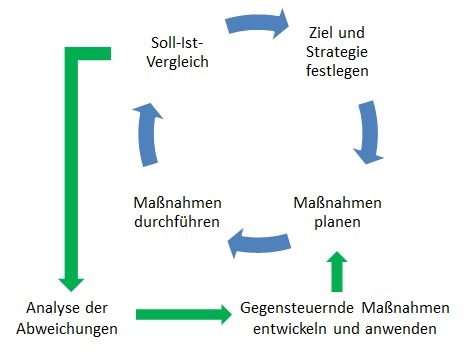
Overview Controlling
What does controlling mean?
"To control" or "controlling" comes from American usage and strictly means "control". However, the meaning is much more extensive and includes the control, guidance and management of processes.
The importance of controlling for a company lies primarily in planning and management. Controlling should provide all entities involved in the target process with instruments and information that are relevant for objective decision-making. In the municipal context, this includes in particular the managers of the city administration and the city council, but also the citizens of the city of Jena. Controlling is to be understood as a control or management cycle, as the following figure illustrates:

Objective
The executives of the city administration of Jena use controlling for the performance of their control and management functions. In this way, they ensure that their decisions are made in a planned, transparent and professionally supported manner. In doing so, controlling provides information on efficiency and effectiveness in the run-up to decisions and in the follow-up as well as in the course of the process. Basically, the development and definition of goals is oriented towards the mission statement of the city of Jena as well as the strategic goals and indicators. The strategic controlling coordinates and supports these development processes.
Dimensions
Strategic controlling
Strategic controlling is based on the entirety of the strategic positioning and long-term development of the city of Jena and develops goals and metrics for goal achievement. Individual special areas such as financial controlling, personnel controlling etc. are not in the foreground, but provide information, can point out strategic deficits, concretise strategic statements.
Operational controlling
Operational controlling concerns the individual special areas within the organizational divisions of the city administration. These can be organisational units, services (products) or individual aspects of organisations (e.g. personnel). Within these special areas, all control-relevant and controllable processes, tasks and services of a mostly short-term nature are identified.
